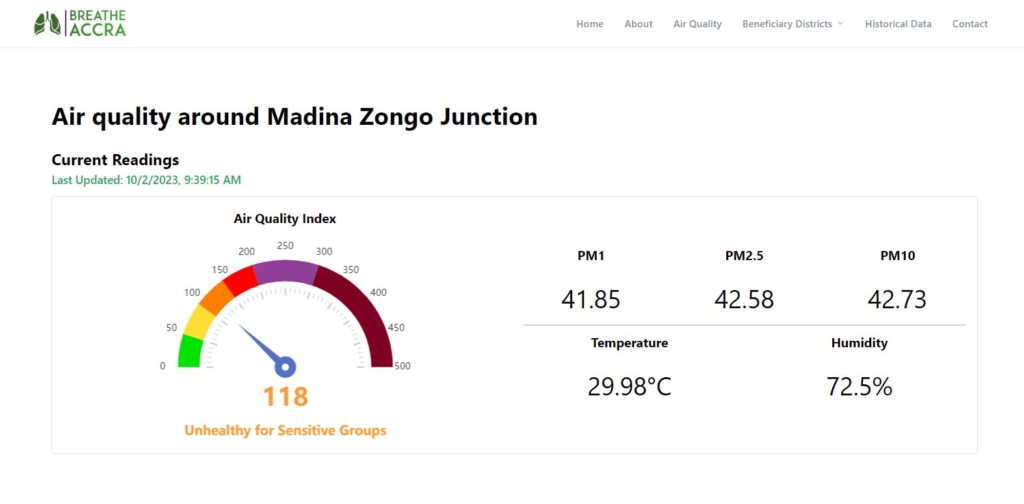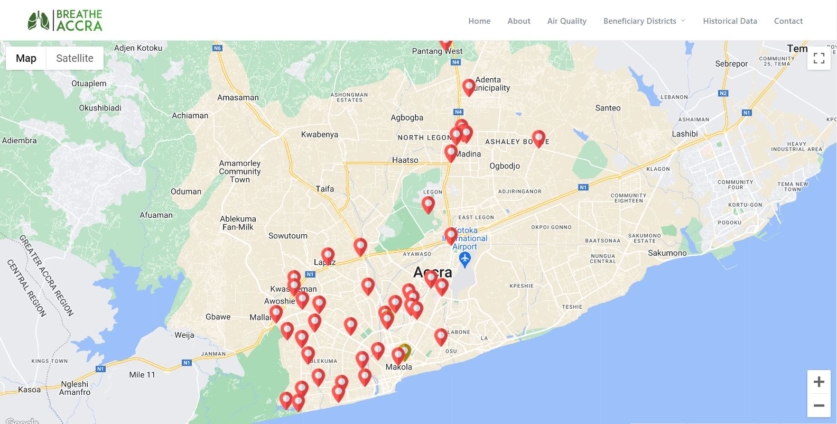Recent air quality data has unveiled a chilling reality that Accra's bustling markets, like Agbogbloshie, Makola, Nima, and Madina, are some of the city's most polluted spots, particularly on market days.
Behind the chaotic market scenes, shoppers unknowingly inhale a deadly mix of pollutants, a hidden cost that comes with their daily purchases.
Agbogbloshie Market, one of the city's largest, wakes up to a thick cloud of fumes, a hazardous blend of pollution.

While the market starts filling with eager shoppers, the noxious atmosphere includes harmful substances invisible to the naked eye.
These pollutants comprise smoke from the burning of waste, vehicle emissions, dust stirred from neglected drains, and harmful fumes from scrapyards that operate around the clock.
"Somebody will bring the copper, then I will burn it and then pay me some small money," says Bina (not his real name), who engages in the daily task of burning wires to extract copper from the rubber coating, earning a meagre ¢15 per day. Burning waste, like other forms of pollution, is illegal.
Ralph Rufi, another marketgoer, burns waste regularly, wearing a protective mask. "The environment is not good for me, so I wear my mask. I burn at night so it won't worry anyone," he explains.

Unknown to many, burning waste indiscriminately is illegal and can lead to fines or imprisonment.
Air quality data from monitoring stations across the region consistently reveals poor air quality levels in areas like Agbogbloshie, Makola, and Nima Market.
Unsuspecting market visitors unknowingly inhale dangerously polluted air while shopping. For most, economic considerations often overshadow health concerns.
Caroline Mensah, one such shopper, explains the harsh reality: "It hits you when you come here. The smell, dirt, you can't breathe."
She acknowledges the possibility that pollutants could have contaminated some of the food items sold there. Nevertheless, for her and many others, economic considerations often overshadow health concerns.
"We have no choice. The price is good here. You’d see the food items displayed on the floor, but we still buy it," says Caroline Mensah.

A noticeable trend in Accra's markets is the rising pollution levels on market days. Pollution tends to peak on Wednesdays and Thursdays when these markets are busiest.
Agbogbloshie sees the highest spike due to increased traffic and market activities. Such conditions result in breathing difficulties and health issues for many shoppers and traders.
Mary Otchere, a trader, has noticed the adverse effects on her health, experiencing headaches and eye irritation due to dust and pollution.
Florence Kuukyi, Director of the Environmental Health and Sanitation Unit of the AMA, and her team are working diligently to combat the pollution issue, ensuring food products are not displayed on the bare ground and monitoring market activities to mitigate exposure.
For now, they advise market patrons to wear masks and thoroughly wash or cook items bought from the markets.
“This story was a collaboration with New Narratives. Funding was provided by the Clean Air Fund. The funder had no say in the content of the story.”
Latest Stories
-
FIFA Club World Cup 2025: Sundowns, Esperance join Al Ahly and Wydad as CAF representatives
4 hours -
CAFCL: Al Ahly set up historic final with ES Tunis
4 hours -
We didn’t sneak out 10 BVDs; they were auctioned as obsolete equipment – EC
8 hours -
King Charles to resume public duties after progress in cancer treatment
8 hours -
Arda Guler scores on first start in La Liga as Madrid beat Real Sociedad
8 hours -
Fatawu Issahaku’s Leicester City secures Premier League promotion after Leeds defeat
9 hours -
Anticipation builds as Junior Speller hosts nationwide auditions
9 hours -
Etse Sikanku: The driver’s mate conundrum
10 hours -
IMF Deputy Chief worried large chunk of Eurobonds is used to service debt
10 hours -
Otumfuo Osei Tutu II celebrates 25 years of peaceful rule on golden stool
10 hours -
We have enough funds to pay accruing benefits; we’ve never missed pension payments since 1991 – SSNIT
10 hours -
Let’s embrace shared vision and propel National Banking College – First Deputy Governor
11 hours -
Liverpool agree compensation deal with Feyenoord for Slot
11 hours -
Ejisu by-election: There’s no evidence of NPP engaging in vote-buying – Ahiagbah
11 hours -
Ejisu by-election: Independent ex-NPP MP’s campaign team warns party against dubious tactics
12 hours

